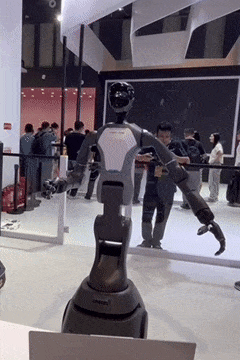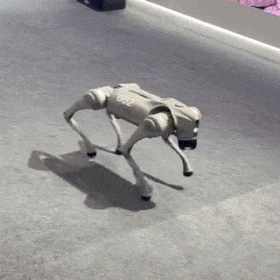On August 21, the 2024 World Robot Conference (WRC) opened in Beijing, drawing significant global attention. This year’s event combines forums, exhibitions, and competitions, showcasing innovations from 169 companies and over 600 products, including more than 60 brand-new releases.
Humanoid robots emerged as the stars of the show, with 27 models on display—more than ever before. These robots captivated audiences with demonstrations ranging from industrial training scenarios to increasingly versatile commercial applications. Visitors were treated to interactive and entertaining displays, such as robots fetching medicine, playing the piano, washing clothes, and making coffee.
Beyond humanoid robots, the exhibition also featured a variety of other embodied intelligent robots. These included robotic arms, quadruped robots, delivery robots, minimally invasive surgical robots, and exoskeleton joints—all demonstrating the latest technological advancements and practical applications.
Humanoid robots in action
Beijing Embodied Intelligence Robot Innovation Center
At the opening ceremony, a special guest took the stage: the humanoid robot “Tiangong 1.2 Max,” developed by the Beijing Embodied Intelligence Robot Innovation Center. This 173-centimeter-tall, 60-kilogram robot confidently carried the conference emblem to the stage, placing it precisely on the podium to mark the official start of the event. This moment was historic, marking the first time an embodied intelligent robot demonstrated long-range task capabilities at a world-class conference.



Tiangong 1.2 Max is China’s first general-purpose robot platform, designed to navigate challenging terrains and perform complex tasks, including running. It employs an imitative reinforcement learning approach that combines the stability of dynamic methods with the generalization strength of reinforcement learning. This enables the robot to simulate human walking and running while navigating environments such as grass, sand, hills, gravel, stairs, and slopes.
In a teleoperation demonstration, Tiangong 1.2 Max mirrored the precise movements of an operator dressed in motion-capture gear. This setup allowed the robot to perform detailed inspections in industrial settings and showcased its adaptability across multiple scenarios, such as dual-arm box lifting and object manipulation.
UBTech Robotics
UBTech Robotics, known for its Walker S humanoid robots, highlighted its capabilities in smart logistics, sorting, and quality inspections at the 2024 WRC.
In one demonstration, a Walker S robot mapped its surroundings using 3D semantic mapping. Through visual recognition and imitation learning, the robot identified boxes on a conveyor belt and applied variable impedance control technology to ensure precise handling and transportation.
While moving parts from the conveyor belt to designated locations, the robot’s built-in multimodal large model recorded data in real time and connected to the smart factory warehouse system, enhancing transparency and efficiency.

UBTech also showcased the Walker S conducting a tire quality inspection on an Audi RS5, completing the task in just 60–80 seconds. The robot’s detection range covered 360 degrees around the vehicle, including areas below 0.5 meters, with an accuracy of over 99%. Additionally, it used a handheld LED light to achieve millimeter-level precision with the help of its onboard cameras.
PaXini Technology
While UBTech focused on functionality, PaXini Technology attracted crowds with its tactile humanoid robot Tora-One, which charmed attendees by gesturing with its hands throughout the event.
Tora-One boasts 47 degrees of freedom and can carry loads up to 6 kilograms with one arm. Its four-finger bionic hands are equipped with nearly 2,000 high-precision tactile sensors, all developed and manufactured in-house by PaXini. These sensors enable the robot to recognize 6D object poses and perform flexible gripping.
The robot uses an advanced visual-tactile multimodal perception model, enabling it to quickly assess its surroundings and break down tasks in complex environments. Combining motion control algorithms with voice interaction systems, Tora-One learns and optimizes its interactions with humans, enabling smooth and diverse collaborative tasks.

PaXini also introduced two new products: the PX-6AX Gen 2 tactile sensor and the DexH13 tactile bionic hand.
The PX-6AX Gen 2, based on ITPU tactile technology, features a second-generation chip design that enables ultra-high resolution tactile perception and precise temperature compensation. The DexH13 bionic hand integrates multidimensional tactile and vision capabilities, allowing it to replicate human hand movements for complex tasks.
Unitree Robotics
Unitree Robotics brought six robots to the 2024 WRC, including the consumer-grade quadruped robot Go2, its wheeled variant Go2-W, the industrial-grade quadruped robots B2 and B2-W, and the humanoid robots H1 and G1.

The G1, standing 127 centimeters tall and weighing 35 kilograms, captivated the audience with its ability to jog at speeds over 2 meters per second and perform high-difficulty actions such as dynamic standing, folding while seated, and baton-twirling. Priced at RMB 99,000 (USD 13,900), the G1 has garnered significant attention since its debut in May.
Unitree also presented the mass-produced version of the G1, which was specially dressed up as Wukong and a mecha at the event, drawing many onlookers. The Go2 quadruped robot also demonstrated a range of tricks, from waving and making hearts to jumping, climbing stairs, and performing handstands—all thanks to its AI-driven reinforcement learning.
Galbot
Galbot was showcased in four live demonstrations: desktop cleaning, shelf picking, shelf replenishment, and box handling. These demonstrations highlighted the robot’s versatility across commercial, industrial, and household settings.
Upon receiving a task, Galbot seamlessly transported boxes from shelves to conveyor belts, which then delivered the boxes to another machine for precise medication identification and placement. The robot’s folding body design allows it to reach heights of up to 2.4 meters and crouch to the ground, enabling it to accurately place items on shelves regardless of their height.
Galbot also impressed with its desktop cleaning demonstration, showcasing its ability to alternate between arms for smooth and precise item handling. These capabilities illustrate Galbot’s potential to manage the full process, from transportation and shelving to cleaning and storage.

LimX Dynamics
LimX Dynamics unveiled the CL-2, its next-generation humanoid robot with increased degrees of freedom in the waist, arms, and legs. This upgrade significantly enhances the robot’s full-body motion control, allowing for precise posture adjustments and improved balance.
During a demonstration, LimX Dynamics showcased the CL-1, an earlier model that has since been upgraded. Despite repeated attempts to destabilize it, the CL-1 maintained its balance, demonstrating impressive anti-interference capabilities. The robot’s load-carrying capacity has also doubled, making it more versatile in performing tasks that involve heavy lifting.

Astribot
Astribot’s S1, its latest AI robot assistant, made its public debut just two days before the conference. The S1 wowed attendees by replicating expert skills in yangqin playing, calligraphy, and sugar painting within hours.

The S1’s advanced AI capabilities enable it to perceive, understand, and make real-time decisions in complex environments. This, combined with its multimodal interaction abilities, makes the S1 suitable for a wide range of tasks.
Astribot achieved a breakthrough in data acquisition, enabling the S1 to gather high-quality multidimensional data from real-world video and human motion capture. This data is used for large-scale training, reducing the costs and challenges associated with training for new tasks, thereby enhancing the robot’s adaptability.
The company plans to commercialize the S1 by the end of 2024.
Meanwhile, Tesla’s Optimus robot was also on display, demonstrating its ability to perform repetitive tasks like battery handling in previously released factory footage. However, at the conference, Optimus remained in a glass case, with no live demonstrations.
In addition to humanoid robots, the 2024 WRC featured a wide array of robots, including delivery robots, industrial robotic arms, medical robots, home robots, and embodied intelligence solutions.
Keenon Robotics
Keenon Robotics created an immersive experience at the conference, where visitors explored how robotic solutions employing embodied intelligence can be applied to sectors like hospitality and healthcare.
The T9 robots, acting as servers, skillfully navigated the crowded venue, guiding customers, delivering meals, and clearing dishes. Meanwhile, the T10 robots served as mobile billboards, interacting with attendees throughout the event.

Keenon’s display also featured a hotel scenario, where various robots were coordinated based on client needs. The delivery robot W3, paired with the cleaning robot C30, demonstrated their ability to manage both delivery and cleaning tasks around the clock, enhancing hotel operations. Additionally, by integrating with hotel systems and external delivery platforms, the W3 robot could increase hotel revenue streams and improve the guest experience.
SenseRobot
SenseRobot, a home robot brand under SenseTime, became a hit with children at the 2024 WRC. The company showcased its latest chess robot, which features specialized AI and mechanical upgrades, including a mechanical claw for picking up chess pieces.
This new design, with four degrees of freedom in the mechanical arm, enables the robot to handle the unique shapes of chess pieces with precision, making it the first home robot to incorporate such a feature. The chess robot is expected to be released in late September.

This article was written by Huang Nan in Chinese was originally published by 36Kr.

